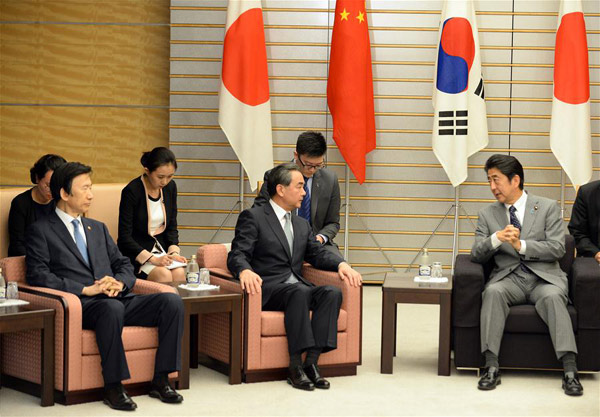China, Japan, ROK seek regional peace and stability
- By Tim Collard
 0 Comment(s)
0 Comment(s) Print
Print E-mail China.org.cn, August 30, 2016
E-mail China.org.cn, August 30, 2016
|
|
|
Japanese Prime Minister Shinzo Abe (R, Front) meets with Chinese Foreign Minister Wang Yi (C, front) and South Korean Foreign Minister Yun Byung-se (L, Front) in Tokyo, Japan, Aug 24, 2016. [Photo/Xinhua] |
A trilateral meeting of North East Asian foreign ministers - China's Wang Yi, the Republic of Korea's Yun Byung-se and Japan's Fumio Kishida - on Aug. 24 demonstrated a new concern that, at least temporarily, overcomes differences between them.
China's relations with Japan have long been uneasy, as a result of Japanese atrocities before and during the Second World War, and China's view that Japan's official response to these historical injuries remains inadequate. Following that, the dispute over the Diaoyu Islands, adds new fuel to the old tensions.
As for the ROK, it was only in 1992 that China finally established diplomatic ties, and while both political and economic relations have blossomed since then, there have always been difficulties related to the longstanding ROK-US alliance.
However, immediately prior to the trilateral meeting, a Democratic People's Republic of Korea submarine fired a ballistic missile that was seen as a direct threat to Japan. This was part of a series of missile launches this year, mostly land-based in defiance of UN prohibition.
The DPRK's missile test certainly brought about a meeting of minds between the three most significant powers in North East Asia. China did not object to the Japanese Foreign Minister's description of the DPRK action as a "provocation that simply cannot be tolerated."
Mr Kishida went on to say he hoped the three countries could "coordinate closely…to lead the efforts of the international community" [in dealing with Pyongyang]. China has not, as some Western commentators have suggested, been encouraging the DPRK in that country's nuclear designs; indeed, China's hopes throughout have been for a peaceful and denuclearised Korean peninsula, and her attendance at the trilateral meeting demonstrates its concerns.
The DPRK has alliances with no-one, and is under no-one's control. Now, the recent demonstrations of nuclear capability shows a real potential for destabilisation on the Korean peninsula - something which China, Japan and the ROK have an overwhelming common interest in averting.
Disregarding politics for a moment, any explosion on the peninsula could cause immense problems for China in the shape of refugees, even if the results were no worse,.
That the Chinese are getting fed up with the DPRK's irresponsible and provocative behaviour was well illustrated by Foreign Minister Wang Yi's statement that, "China opposes the DPRK's nuclear and missile process, actions that cause tension on the Korean Peninsula," made at the post-meeting news conference.
More importantly, though, the meeting focused on regional threats like those caused by the DPRK's ambitions, tensions between Tokyo and Beijing over the dispute over East China Sea islands and undersea gas development were also addressed. The rapprochement between the two countries over the DPRK may well help reduce confrontation over the disputed islands.
The tripartite meeting was a very positive example of how countries with deep-seated disputes can find common ground in face of a commonly perceived danger. Despite the fact that both Japan and the ROK are allies of the US, thus possibly arousing Chinese suspicions, the three countries can obviously still come together to discuss common interests in dealing with a rogue element in regional affairs. Their joint request to the DPRK was to refrain from provocation and follow UN Security Council resolutions, which is hardly an unreasonable demand.
The problem of the unsettled Korean Peninsula is a very entrenched one, and cannot be resolved except by collective action by the countries in the region. The pacification and denuclearisation of the peninsula, as demanded by China, is a vital necessity for global peace, not to mention the economic development of the region.
The Chinese Foreign Ministry spoke of a trilateral agreement to focus on "building up political trust, carrying out pragmatic cooperation, expanding people-to-people exchanges and pushing ahead with sustainable development", thus emphasising the genuine common causes threatened by unnecessary military provocations. The DPRK, by behaving in this disruptive manner, is out of step with the real wishes of the region's people.
This trilateral meeting shows there is hope for a genuine and long-term relaxation of tensions in the North Pacific region, which can only be of benefit to the world as a whole.
Tim Collard is a columnist with China.org.cn. For more information please visit:
http://www.ccgp-fushun.com/opinion/timcollard.htm
Opinion articles reflect the views of their authors, not necessarily those of China.org.cn.






